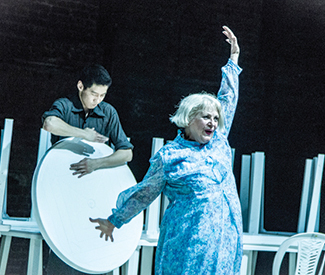THEATER Moscow’s temperatures had been climbing up to 70 degrees just a week before my arrival, but by the first of April, it had slipped back into the 30s and 40s, collecting snow on the ground and clouds overhead in a gloomy replay of winter. In a novel this would have looked like a cheap literary device: nature manifesting a political climate that had also grown decidedly chillier. But with Russia’s recent reabsorption of Crimea, and talk everywhere of a new Cold War, it was pretty apt nonetheless.
At the same time, theatrical fires were burning brightly in the weeklong Russia Case, an annual mini-festival spotlighting (for an international audience of presenters, journalists, and others) exceptional theatrical work from the much larger national Golden Mask Festival, with some additional offerings thrown in for good measure.
Curated by Kristina Matvienko, theater critic and member of the Golden Mask board of experts, this year’s Russia Case included 20 productions, in addition to other public events, such as an absorbing tour of Moscow’s famed Taganka Theatre, the country’s center of theatrical innovation and radicalism in the 1960s–70s under founding director and actor Yuri Lyubimov. It’s now celebrating its 50th year with a special jubilee program of exhibitions, projects, and new work headed by a group of young theater artists, managers, and critics commissioned by the city’s Culture Committee and Cultural Minister Sergei Kapkov.
Things began auspiciously with a sparkling new piece by famed director Kama Ginkas at Moscow TYuZ (pronounced “tooz” and standing for Young Generation Theater), the theater led by his wife, Henrietta Yanovskaya, also an acclaimed director with a production in the festival. Lady Macbeth of Our District, based on a short story by 19th-century Russian writer Nikolai Leskov that was also adapted into an opera by Shostakovich, concerns the ebullient young wife of a village merchant whose lust for life entangles her with a brash laborer with tragic results. Staged with muscular precision and effortless invention — including a shrewd use of winter coats as malleable second-skins and visceral bursts of song and energetic movement — this excellent ensemble piece, led by the vibrant Elizaveta Boyarskaya in the title role, cut right through the serious jetlag of the hour.
Among other highlights was a new work by internationally renowned director Dmitry Krymov (whose In Paris premiered locally at the Berkeley Rep in 2012). The captivating Honoré de Balzac: Notes About Berdichev derives its title from a line in Three Sisters, and this inspired riff on Chekhov’s characters sneaks in a fitting depth of thought and emotion beneath its macabre comical surface. With the consummate attention to design and ensemble playing that Krymov and his collaborators have rightly become known for, the production unfolds as a kind of Grand Guignol spectacle, holding up a funhouse mirror to the iconic figures of Chekhov’s oeuvre in order to see them afresh as the pitiful, horrifying, hilarious, and beautiful creations they are. The production then shifts into a prolonged denouement in which the actors remove their elaborate makeup and converse and play with one another in a wistful and teasing middle ground between art and life that speaks quietly of that communion that is the essence of theater.
Equally effective was a timely adaptation of a Rainer Werner Fassbinder film at the vibrant Gogol-Centre, a new and leading venue with four resident companies and a popular youthful following. Fear, adapted by young playwright Lyubov Strizhak from Fassbinder’s Ali: Fear Eats the Soul, is one in a trilogy of works by Latvian director Vladislav Nastavshev that adapt famous films (the others being Visconti’s Rocco and His Brothers and Lars Von Trier’s The Idiots, each in some way dealing with the negotiation of borders and the plight of outsiders). The story concerns the socially unsanctioned love affair between a young Tajik migrant worker and an elderly Moscow widow. Unfolding with a bold, forceful grace on a spare arena-style stage that made dynamic use of a set of white plastic tables, this well acted and moving piece was also among the most overtly political, dealing head-on with the rising xenophobia that has plagued Russia in general and Moscow in particular in recent years. (The one other piece in the program with comparable political punch came from the tiny but intrepid Theater.doc, an independent documentary theater, run by Elena Gremina. Documentary theater is the mode of choice for much political work on Moscow stages, and perhaps not surprisingly Fear‘s playwright Strizhak is well associated with the form.)
In all, I took in half of the total program of the Russia Case, in a packed week of theater and discussion, as part of a group of Americans traveling under the auspices of the Center for International Theatre Development. Needless to say, politics were in the air throughout, and not only because of recent events in Ukraine. The theater in Russia is far more culturally important and influential than theater tends to be here. And while not overtly political in what it stages (except in some notable instances like those just mentioned), it remains a site of many progressive and antiauthoritarian voices as well as big personalities and vested interests. Even the Taganka jubilee was marked by internal turmoil and public scandal, stemming in part from Lyubimov’s contentious public departure from the theater in 2011 but sparked by a historical exhibition on the walls of the theater that provoked defacement from outraged members of the company.
More broadly and urgently, however, the Russians and their international guests mulled over the future of theater in a country drifting rapidly toward ultranationalist extremes. All seemed to agree that whatever happens, this year’s Russia Case will likely not look like next year’s, and that artists and audiences are in for a wild ride.

